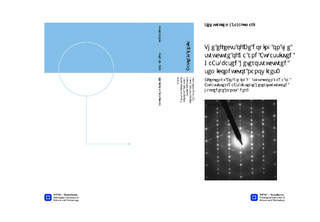The effects of Be doping on the structure of Ga and Au-assisted GaAs-based heterostructured semiconductor nanowires.: Effekten av Be-doping på strukturen av Ga og Au-assistert GaAs-baserte heterostructured halvledere nanotråder.
Master thesis
Permanent lenke
http://hdl.handle.net/11250/246908Utgivelsesdato
2013Metadata
Vis full innførselSamlinger
- Institutt for fysikk [2677]
Sammendrag
The crystal structures of Gallium Arsenide (GaAs) based heterostructured semiconductor nanowires (NW) doped by different beryllium (Be) concentration grown by molecular beam epitaxy were characterized with the help of transmission electron microscopy techniques. Transmission electron microscopy (TEM) is a good tool to get a detailed set of crystallographic information from each nanowire batches. Two batches of nanowires are with different Be concentration, gold (Au) assisted, grown on GaAs substrate and the next two batches with different Be concentration, Gallium (Ga) assisted, grown on Silicon substrate were characterized. In addition to this, nanowire substrate interface were characterized, since sample preparation for TEM was a challenging experience. Four batches of nanowires were compared and analyzed. Doping concentration of Be affects the nanowire morphology and crystal structure. In Au assisted nanowires with low Be concentration are rod shaped nanowires. Whereas the nanowire batch with high Be seems to be tapered in morphology on the nanowire side facets and the crystal structure in both batches are zinc blende (ZB). Interestingly the Au-catalyzed highly doped nanowires have high density of stacking faults in which randomly distributed twins and periodic twinning or twinning super lattice were observed The next two NW batches are self-catalyzed and low doped Be has rod shaped in morphology and the one with highly doped Be tend to develop different nanowire morphology with respect to each other. The crystal structures in these two batches are also zinc blende (ZB). In general, Be was found to be incorporated even though the Be doping concentration is high or low in all the four nanowire batches. Compared with all the four NW batches, Be has a tendency to form ZB crystal structure. This investigation contribute to the understanding of incorporation of Be in nanowires, so that in future the knowledge helps to determine strategies on how to control the crystal defects and crystal phases of nanowires, for the application of optoelectronic nanowire based devices.
